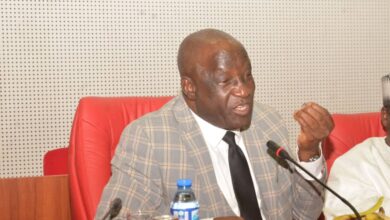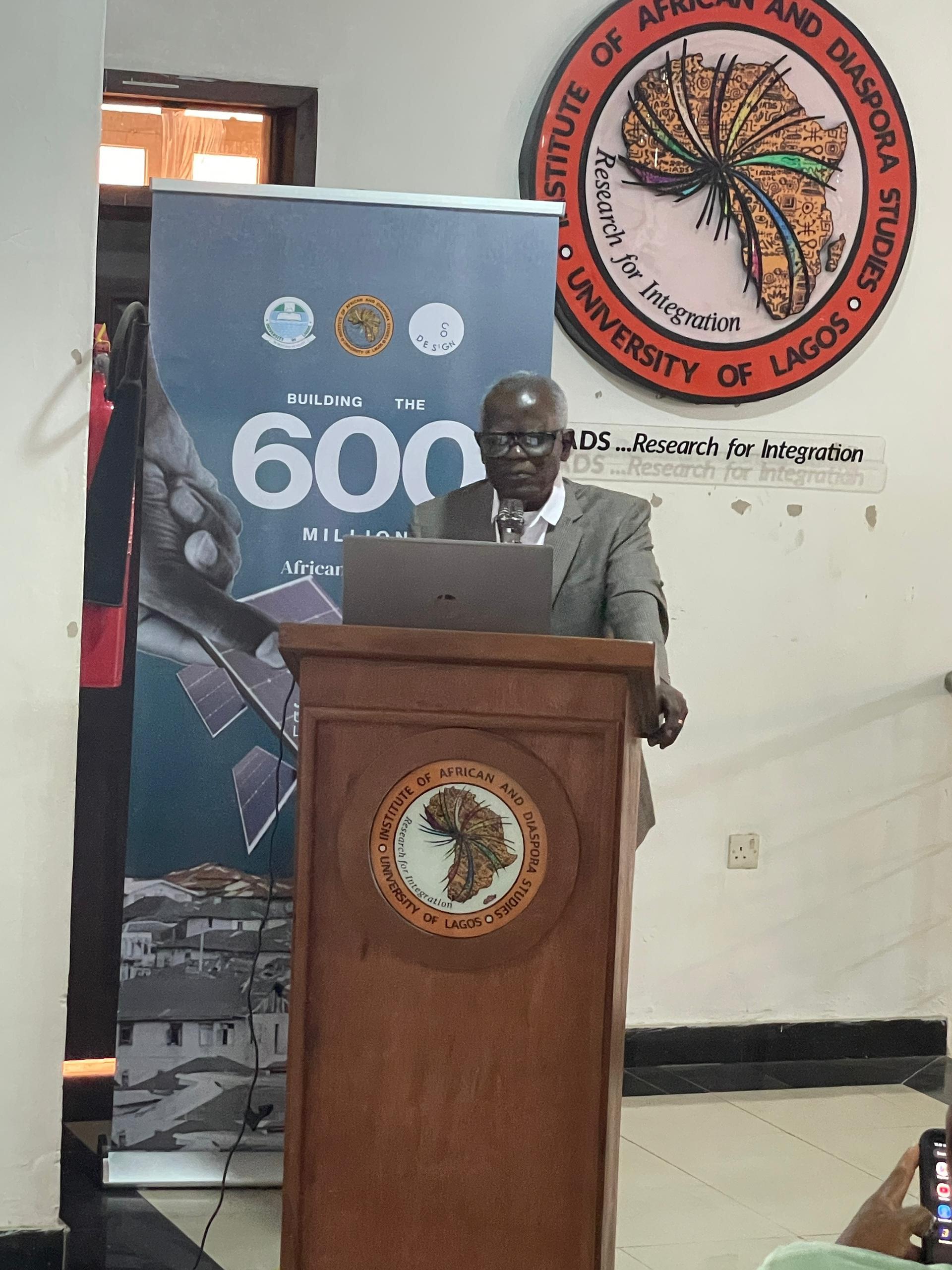Senate Reconvenes with Solemn Tributes: Senator Zangon Daura Eulogises Late President Buhari’s Legacy of Integrity, Patriotism, National Transformation
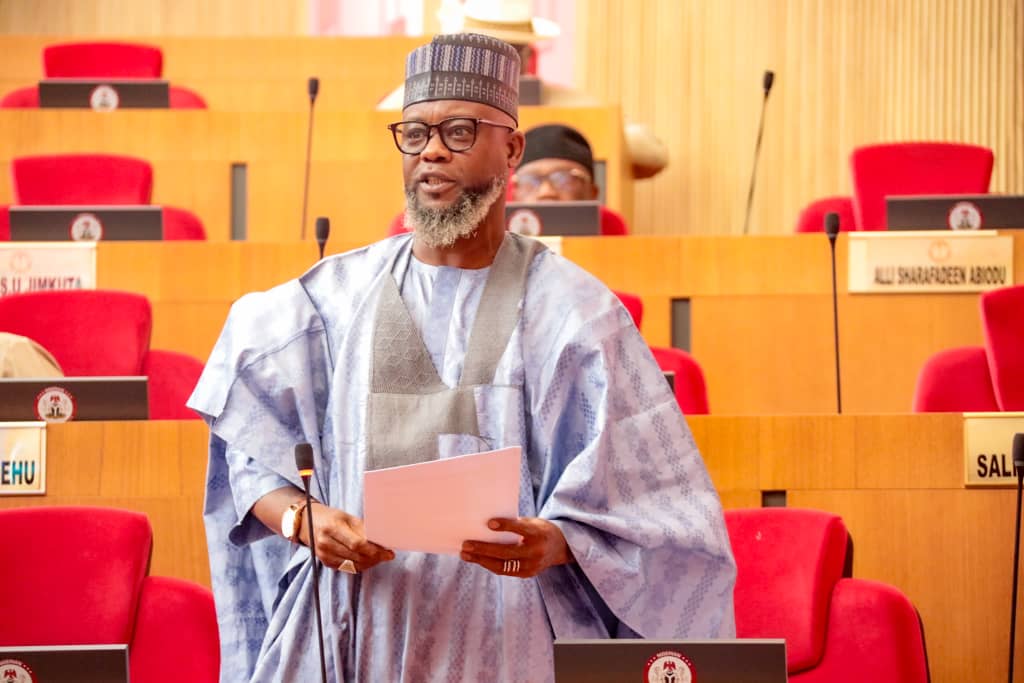
…….Rally his colleagues to be humble while in office
By Fatima Saka
Abuja – The Nigerian Senate resumed plenary with a solemn atmosphere, as the lawmakers reconvened from a week-long recess declared in honour of the late former President Muhammadu Buhari, who passed away on the 13th of July, 2025 in London and was laid to rest in his hometown of Daura, Katsina State.
Leading the tributes on the floor of the Senate on Wednesday in Abuja, Senator Nasiru Sani Zangon Daura, representing Katsina North Senatorial District and Chairman of the Senate Committee on Cooperation and Integration in Africa and NEPAD.
[arve url=”https://youtu.be/8WCdpfVw21A?feature=shared” title=”Senator Zangon Daura Eulogises Late President Buhari’s Legacy of Integrity, Patriotism, National Transformation” description=”In an emotional and historic eulogy, Senator Zangon Daura painted a portrait of Buhari not just as a former Head of State and President, but as a father figure, a moral compass, and a leader who shaped the trajectory of Nigeria through decades of service” upload_date=”2025/07/23″ thumbnail=”14761″ /]
In an emotional and historic eulogy, Senator Zangon Daura painted a portrait of Buhari not just as a former Head of State and President, but as a father figure, a moral compass, and a leader who shaped the trajectory of Nigeria through decades of service.
A Life of Service to Nigeria
Senator Zangon Daura, in his address titled “Eulogy for Muhammadu Buhari GCFR, Former President of the Federal Republic of Nigeria,” began with the Quranic verse, “Inna lillahi wa inna ilaihi raji’un”, “Indeed, to Allah we belong and to Him we shall return”, framing the tribute in a tone of spiritual reflection and reverence.
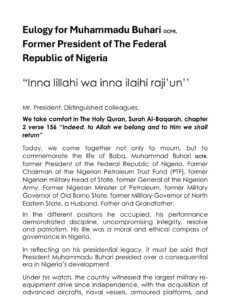
“Today, we come together not only to mourn, but to commemorate the life of Baba, Muhammadu Buhari GCFR… a husband, father, grandfather, a soldier, and a statesman,” he said.
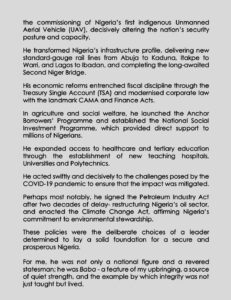
Buhari’s passing marked the end of an era for a man who held virtually every significant public office in Nigeria, from Military Governor of the North-Eastern State to Head of State, and later, two-term democratically elected President of Africa’s most populous country.
Legacy of Discipline, Reform, and Infrastructure Development
Senator Zangon Daura chronicled Buhari’s legacy in governance, highlighting landmark policies and developments during his eight-year civilian presidency (2015–2023). Among the most prominent achievements were:
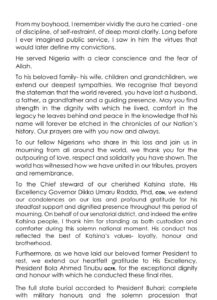
Security Reforms: The re-equipment of the Nigerian Armed Forces, with acquisitions of modern aircraft, naval ships, and Nigeria’s first indigenous Unmanned Aerial Vehicle (UAV), which transformed the nation’s security capabilities.
Infrastructure Expansion: Delivery of key national projects including the Abuja-Kaduna, Lagos-Ibadan, and Itakpe-Warri standard-gauge rail lines; the completion of the long-awaited Second Niger Bridge; and expansion of road infrastructure across the six geopolitical zones.
Economic Discipline: Introduction of the Treasury Single Account (TSA) to curb leakages, and passage of long-stalled reforms like the Companies and Allied Matters Act (CAMA) and the Finance Acts, which enhanced transparency in business regulations.
Social Welfare and Agriculture: Implementation of the Anchor Borrowers’ Programme to boost agriculture, and rollout of the National Social Investment Programmes (NSIP), which provided direct support to millions of vulnerable Nigerians.
Health and Education: Establishment of new teaching hospitals, universities, and polytechnics to expand access to healthcare and higher education, especially in underserved areas.
Petroleum and Climate Reform: Signing of the Petroleum Industry Act after two decades of delay, and enactment of the Climate Change Act, reflecting Nigeria’s commitment to environmental sustainability.
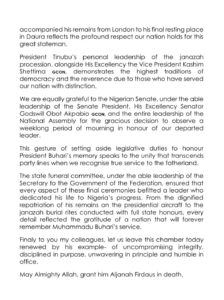
“These policies were not accidents. They were the deliberate choices of a leader determined to lay a solid foundation for a secure and prosperous Nigeria,” Daura said.
A Personal Tribute: “He Was Baba to Me”
Beyond Buhari’s public image, Senator Zangon Daura offered a deeply personal tribute to a man he described as an enduring presence in his own life.
“He was Baba, a feature of my upbringing, a source of quiet strength, and the example by which integrity was not just taught but lived,” he said, recalling early memories of Buhari’s disciplined and austere lifestyle that would shape his own values in public service.
Nationwide Mourning and Bipartisan Honour
The Senator extended appreciation to President Bola Ahmed Tinubu GCFR and Vice President Kashim Shettima GCON for leading the state burial with dignity and honour, noting that their personal involvement in the janazah procession demonstrated the nation’s collective gratitude.
The tribute also recognised the role of the Nigerian Senate and National Assembly, led by Senate President Godswill Akpabio, in suspending legislative activities for an entire week, a rare bipartisan gesture that underscored Buhari’s stature as a national figure whose service transcended party lines.
“This gesture speaks to the unity that transcends political divides when we recognise true service to the fatherland,” Zangon Daura added.
He equally expressed gratitude to Katsina State Governor, Dikko Umaru Radda, for his role in guiding the state through the mourning period with honour and empathy, describing him as “both custodian and comforter.”
A Call to Emulate Buhari’s Values
Senator Zangon Daura concluded with remarks, rallying his colleagues in the National Assembly to let Buhari’s life inspire their actions:
“Let us leave this chamber today renewed by his example of uncompromising integrity, disciplined in purpose, unwavering in principle, and humble in office.”
He prayed for Almighty Allah to grant the late President eternal rest in Aljanah Firdaus, assuring Nigerians that Muhammadu Buhari’s name will remain forever etched in the nation’s history.
READ ALSO: Senate Defections Jolt PDP as Four Lawmakers Join APC, Redrawing 2027 Political Map
General Muhammadu Buhari, GCFR, served as Nigeria’s Head of State between 1983 and 1985 following a military coup, and returned to power through the ballot box in 2015. His civilian administration focused heavily on anti-corruption, infrastructure development, and agricultural revitalization. He died in London after a brief illness and was buried in Daura, Katsina State, according to Islamic rites.
His death has triggered a wave of tributes across political and religious lines, with international messages of condolence pouring in from world leaders.

